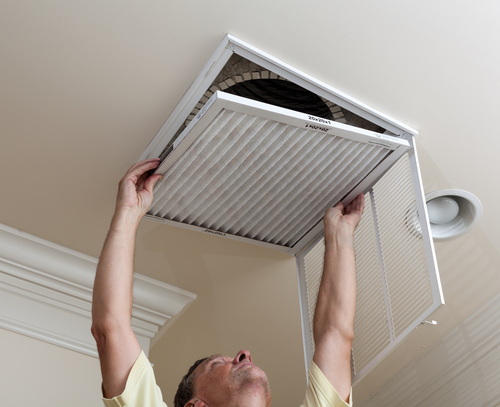The air filters on your heating and cooling system are little things that do a big job, but they do it so quietly we often forget they’re even there. However, as they protect your equipment and indoor air from dust and debris, they get dirty and clogged over time. Manufacturers generally recommend changing them at least every three months, and sometimes more often, depending on what type of filter you’re using.
Air filter performance rating
Air filters are rated according to their Minimum Efficiency Reporting Value (or MERV). This indicates how efficiently the air filter traps particles in the air. The higher the rating, the more efficient the filter is at removing things like dust, bacteria, viruses, pollen, and mold. The MERV rating scale goes from 1 to 20 and most standard filters fall somewhere in the 1 to 16 range.
Air filter types
There are several types of air filters on the market. Sometimes equipment manufacturers require a certain type of air filter for their warranties, but they fall within these general categories:
Washable filters
These are reusable after washing and can be a cost-effective option. However, they have low MERV ratings, which means they are better for protecting your equipment against larger pieces of dirt and debris. They don’t work well for filtering out things like smoke, pet dander, or other allergens.
Fiberglass filters
These filters are made from layers of hair-thin glass fibers which are formed into a pleated, paper-like material. While they are not washable and reusable, they are an inexpensive option and easy to install. They also have a lower MERV rating, but their purpose is to keep your equipment clean rather than your indoor air.
Pleated, polyester filters
These are made similar to standard fiberglass filters but have a much higher MERV rating and are more expensive. However, where fiberglass filters remove up to 10 percent of indoor particulates, pleated polyester filters remove up to 85 percent. They do a much better job of keeping both your equipment and your indoor air clean.
HEPA filters
HEPA stands for High Energy Particulate Arresting. These are the most expensive filters, but also the most stringent filters, with a MERV rating of 17 to 20 because they remove over 99 percent of irritants in the air. These filters are good for those who suffer from severe allergies.
Match your filter to your needs
Sometimes you might think the higher the MERV the better, but there’s a balance between cost and performance. Additionally, a system that has ultra-high filtration can actually run less efficiently. Filters that are especially dense can slow airflow across the heat exchanger to a degree that it can overheat and even cause damage to residential HVAC systems.
Before installing a HEPA filter, you should consult the trusted, licensed HVAC techs at Heating Specialties to determine the optimum MERV rating balanced against maximum air flow. Getting the right air filter – and replacing them as recommended – are the best ways to optimize efficiency and extend the life of the heating and cooling equipment in your New Jersey home.

